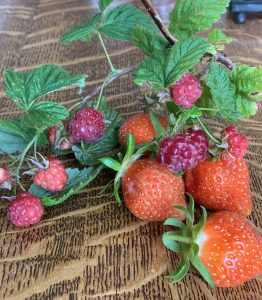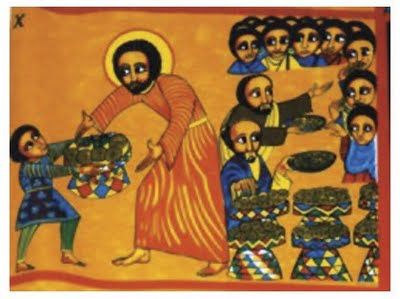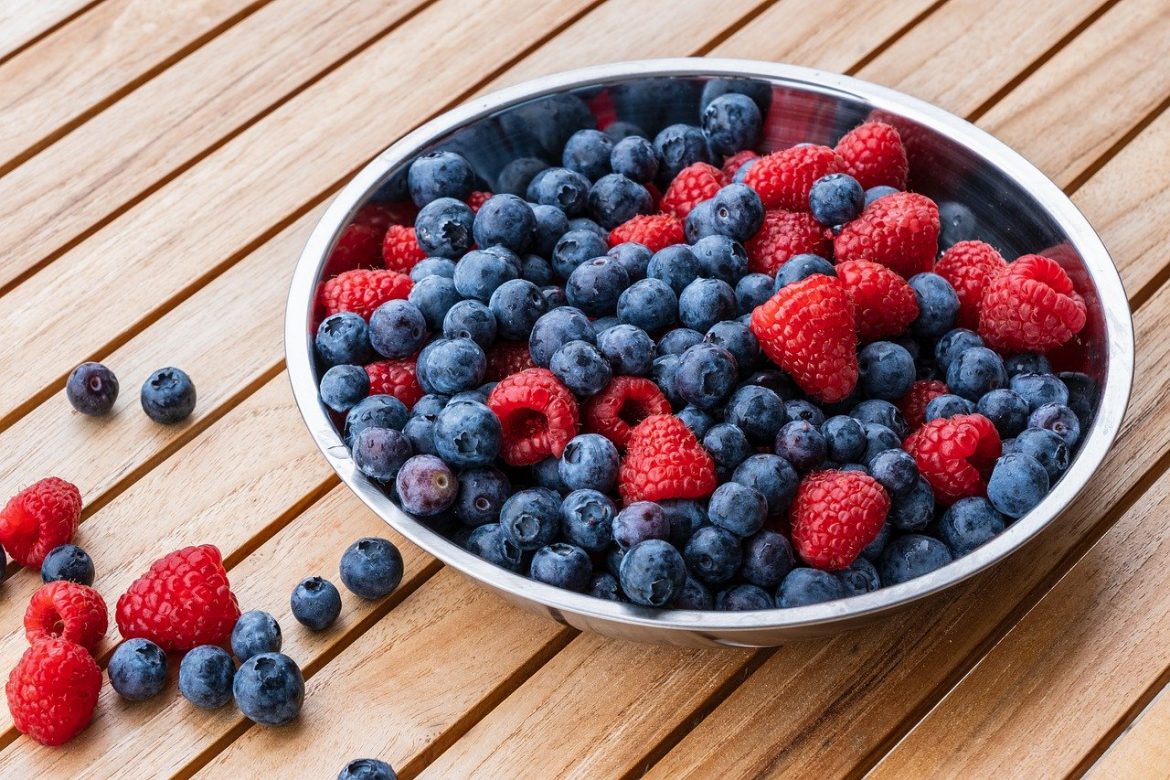by Christine Sine
Over the last couple of weeks everyone at the Mustard Seed House has been hungrily devouring the strawberries in our front yard. And soon will come the raspberries and blueberries and cherries. In each case, there are not many of them, but these first fruits of the season taste the best of any fruit you will ever get out of the garden, partly I think because there are so few of them and they have been long anticipated over the winter. As you can imagine, I am tempted to eat them all myself yet I know that I need to share these “first fruits” and each day try to give another member of our small community at least a couple of these delectable fruits.

Living in anticipation
First fruit are always held in high regard in the Bible too. In Deuteronomy 20:6 we read, “has anyone planted a vineyard but hasn’t enjoyed its fruit yet? Go back to your house because if you did in this battle, someone else would be the first to enjoy its fruit.” Wow. That is high regard indeed but what delight to think that this first produce was so highly valued that it was a reason to stay home from war.
What must have been particularly challenging was the command to give some of these first fruits to the priests and temple workers (Ezekiel 44:30). Sharing the first fruits of any harvest is always challenging but in agrarian cultures, first fruits came at a time when everyone was lean and hungry, wondering whether their stored goods would last until abundance once more filled the earth. The need to give first fruits to the priests would have been particularly hard on the poor and the marginalized. It seems to me that this principle of first fruits to the priests only works well when it is combined with a culture of sharing and generosity where the whole community makes sure that those who do not have enough are provided for too, not with the dregs but with the best that the community has to offer.
I see this principle throughout the Bible too.
In 2 Kings 4:42-44 we read about the first fruits:
a man from Baal-shalishah brought some food from the first fruits of the harvest to the man of God: in his sack were 20 barley loaves and fresh produce still in the husk.
Elisha: Distribute this food to the people so that they may fill their hungry bellies.
Servant: Do you really think this will be enough for 100 hungry men?
Elisha:Yes, do as I said, and distribute this food to the people. The Eternal One says, “They will fill their bellies and still have some food left over.”
He handed out the food to them; and exactly as the Eternal One said, they ate and had food to spare.
Then from the gospel of John 6:1-21 – the story of the little boy with five loaves and two fish.
The servant and the disciples do the maths, and know it is impossible. They act like hired hands or slaves, not believing in the impossible but obeying begrudgingly, without much joy or hope. They were probably filled with anxiety and the rumbling of their stomachs probably made them resent the crowds around them.
 Contrast the little boy, a child – probably surrounded by a flock of friends, all laughing, excited egging him on, like flocks of kids that used to follow us in African villages. They alone believe in the possibility that Jesus can and will perform a miracle. In many ways this little boy’s offering is a first fruits offering too. He doesn’t have much, but what he has, he is willing to give. This is the first time as far as we know that he has given anything to Jesus, something small that Jesus could make big.
Contrast the little boy, a child – probably surrounded by a flock of friends, all laughing, excited egging him on, like flocks of kids that used to follow us in African villages. They alone believe in the possibility that Jesus can and will perform a miracle. In many ways this little boy’s offering is a first fruits offering too. He doesn’t have much, but what he has, he is willing to give. This is the first time as far as we know that he has given anything to Jesus, something small that Jesus could make big.
Today, first fruits may not mean the difference between hunger and a full stomach but there is still something wonderful about them. The first tomato of the season excites taste buds that have not been stimulated since last season and we want more! Surely there is only enough for me (and maybe for Tom.) Yet now we are being asked to share – a paltry amount – nowhere near enough to feed the 8 people in our community let alone 100 hungry men, or a crowd of more than 5,000 hungry men, women and children. It is impossible to believe we can hand it out, feed everyone and still have some left over.
I wonder today as I reflect on these stories “how often do we get caught in an attitude of scarcity because we react as servants rather than as children of God? We look at what we have to offer be it food, or talent, or money and don’t think there is enough for our own needs let alone an abundance to share. We don’t get excited about the possibilities of what God can do and resent God’s invitation to be generous with the first fruits of our labours. We have done the maths and know that there is just not enough for everyone.
Kids are not great mathematicians but they are great sharers and they are great believers in the awe and wonder of miracles. When they see someone with a need they are right there wanting to help and they believe what they have in their hands can make a difference.
What will it take for us to become like children again – excited, expectant and eager to share because we know that in the hands of Jesus the little we have can always be transformed into enough for everyone? The really exciting and awe inspiring thing is that when we begin to share we do see our first fruits multiplied, our excitement grows and we become generous with everything that God places in our hands.
Can you imagine how that kid and his friends must have felt after they watched the huge crowd eat from their little offering? I am sure they talked about it for days if not years afterwards.
So I find myself wondering again: Were some of these kids amongst the early believers in Acts 2:42-47 once more filled with awe and wonder as they now shared meals and possessions together? Did they remember that first time of sharing when they saw Jesus perform a miracle of provision for a great crowd and so believed that he could still multiply their possessions to provide for everyone?
What Is Your Response?
Romans 8:15 tells us that we are not slaves or servants but children of God yet we rarely act as children. We don’t play, get excited or gasp in awe and wonder at the world and its abundance.
Sit prayerfully for a few minutes and think back to your childhood. What is one occasion you remember when you got excited about sharing with others/ How did you feel? What further responses did it stir in you?
What would it take for you to act as a child today? What “first fruit” do you think God might be prompting you to share? How can you respond.
For more reflections one “first fruits” you might like to check out Offer Your First Fruits to God.

